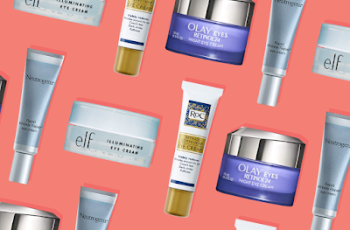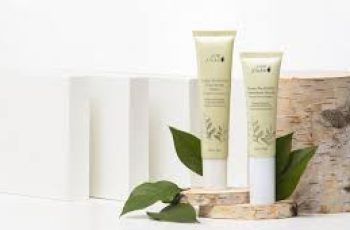
The Science of Zeaxanthin in Skin Care
Zeeaxanthin is an increasingly popular antioxidant ingredient with great untapped potential.
This carotenoid has been well-studied as an additive to oral supplements and has some notable benefits in skin care as well. Learn how this ingredient works and how it compares to the competition.
Do you want to know the secret to healthier skin? Take the Baumann Skin Type Test to learn your skin type and get personalized product recommendations!
Your skin type results will serve as the basis for selecting the ingredients and formulas that are best suited to your individual skin concerns.
There is no better way to know if a product is right for your skin!
What is Zeaxanthin?
Zeaxanthin is a yellow-orange carotenoid antioxidant that occurs naturally in many fruits and vegetables. Carotenoids are plant pigments that give vegetables their bright orange and yellow colors.
There are over 600 carotenoids found in nature, but only about 20 are found in human blood and tissues.
Zeaxanthin is one of the three most important carotenoids in the human eye, the other two being lutein and mesozeaxanthin.
(9) These compounds are found in the retina and lens of the eye, forming a bright yellow pigment that filters out harmful blue light and protects the eye from UV rays.
Zeaxanthin’s antioxidant properties enable it to neutralize free radicals and prevent oxidative stress.
This protects the skin from premature aging caused by sun exposure, stress, and environmental pollution.
How does Zeaxanthin work?
Zeaxanthin, when applied topically or orally, provides significant antioxidant protection to human skin cells. It works in a number of ways:
Neutralizes free radicals: As a powerful antioxidant, zeaxanthin is able to donate electrons to stabilize harmful free radicals, preventing them from causing oxidative damage to skin cell membranes and DNA. (1.7)
Reduces inflammation: Zeaxanthin inhibits certain pro-inflammatory responses to sun damage. (11)
UV protection: By absorbing UV rays, zeaxanthin protects the skin from sunburn, DNA damage, and general UV exposure.
Keeps the skin moisturized: By slowing the breakdown (peroxidation) of fatty acids in the skin barrier, zeaxanthin helps the skin retain moisture. (6)
Boosts collagen production: Zeaxanthin stimulates fibroblasts to produce more collagen, a protein that helps firm and elastic skin. (3)
Benefits of Zeaxanthin
Benefits of Zeaxanthin in Skin Care
Most studies on zeaxanthin have involved its use in oral supplements, but further research is ongoing on the use of this ingredient in skin care.
Current research suggests that increased intake and topical application of zeaxanthin may provide the following benefits:
Reduces signs of aging: Zeaxanthin may reduce wrinkles, hyperpigmentation spots, and roughness, regenerating aged, sun-damaged skin.
Prevents skin cancer: By neutralizing free radicals caused by UV rays, zeaxanthin may reduce the risk of melanoma and non-melanoma skin cancers.
Relieves acne and rosacea: Zeaxanthin’s anti-inflammatory effects can relieve irritation and redness in inflammatory skin conditions.
Boosts hydration: Zeaxanthin increases the epidermis’ ability to retain moisture, making the skin appear plumper and more refreshed.
Improves elasticity: Zeaxanthin stimulates collagen production, which enhances skin’s firmness and elasticity.
Evens out skin tone: By combating photodamage and partially inhibiting tyrosinase, zeaxanthin may help prevent and treat dark spots. (4)
Is Zeaxanthin Safe?
Zeeaxanthin in skincare products and oral supplements is very safe. It is nontoxic, even in high doses.
The only side effect reported is a harmless change in skin color due to beta-carotene (orange hue).
The Environmental Working Group (EWG) gave zeaxanthin a safety rating of “1,” meaning it is considered very safe.
If you’re looking for an all-natural anti-aging ingredient, zeaxanthin may be the right choice for you!
Zeeaxanthin vs. Retinol
Zeeaxanthin vs. Retinol
How does zeaxanthin compare to anti-aging superstar retinol?
Retinol speeds up cell turnover, makes skin younger and plumper, and stimulates collagen production. However, it can cause irritation, dryness, and sun sensitivity in some people.
Zeeaxanthin is gentler than retinol. It has antioxidant protection and anti-inflammatory properties that soothe and care for sensitive skin.
Retinol can make the skin more sensitive to light, so sunscreens need to be used with caution. Zeaxanthin has natural sunscreen protection.
Sensitive skin that is easily irritated may tolerate zeaxanthin better than prescription retinoids.
Zeaxanthin can boost collagen production and moisturize, making the skin firmer and smoother, just like retinol, but with fewer side effects.
While the two ingredients are similar, they have different functions and are best used at different times of the day. Zeaxanthin is a good sunscreen, but retinoids are not.
Using a zeaxanthin product in the morning and a retinol product in the evening is the right way to incorporate both into your daily routine. (1,2)
Topical Zeaxanthin vs. Oral Zeaxanthin
While zeaxanthin is often taken as a dietary supplement, research has demonstrated benefits for both oral and topical use:
Oral Zeaxanthin: Intake through food or supplements can increase skin antioxidant levels. However, only a small amount reaches the skin.
Topical zeaxanthin: Applied directly to the skin’s surface in the form of a cream or serum. Provides more targeted antioxidant protection for the skin.
For best results, I recommend combining oral and topical zeaxanthin to enhance internal and external photoprotection.
(5) Look for zeaxanthin in skin care products formulated with other antioxidants, such as vitamins C and E.
Which skin types are good candidates for Zeaxanthin?
Which skin types are good candidates for Zeaxanthin?
Zeeaxanthin has a variety of anti-aging and soothing benefits that are suitable for all skin types. However, those who are particularly likely to benefit are:
Dry, dehydrated skin: Zeaxanthin helps keep the skin barrier healthy, thereby retaining moisture.
Sensitive, reactive skin: Zeaxanthin reduces inflammation and is less irritating than retinol.
Mature skin: Zeaxanthin stimulates collagen production, reduces wrinkles, and firms and brightens aging skin. (1,3)
Acne-prone skin: Antioxidant and anti-inflammatory properties help prevent acne breakouts.
Sun-damaged skin: Zeaxanthin prevents UV-induced hyperpigmentation and fights skin cancer. (6)
Currently, there aren’t many skin care products that contain zeaxanthin, as it is still in the research phase and being adopted by the industry.
While the skin care world prepares for zeaxanthin, there are many other products and great ingredients you can take advantage of!
Zeaxanthin dietary supplements
Most commercially available zeaxanthin supplements protect the eyes, not the skin. Here are some supplements that protect the skin from sun damage.
Most of these products do not contain zeaxanthin, but instead contain other carotenoids, vitamin C, or white algae.
[[SP09]]
Overview
The antioxidant zeaxanthin provides comprehensive skin-enhancing benefits when applied topically and taken orally.
By neutralizing free radicals, reducing inflammation, protecting the skin from UV damage, moisturizing the skin, and promoting collagen synthesis, zeaxanthin helps promote smoother, firmer, more youthful-looking skin.
Although further research is needed, animal and human studies have shown excellent efficacy and safety. Zeaxanthin is gentler than prescription retinoids, making it ideal for sensitive skin.
Unfortunately, we do not currently carry any products containing zeaxanthin, but you can still take the Bowman Skin Type Quiz to see which products are right for your Bowman skin type.


